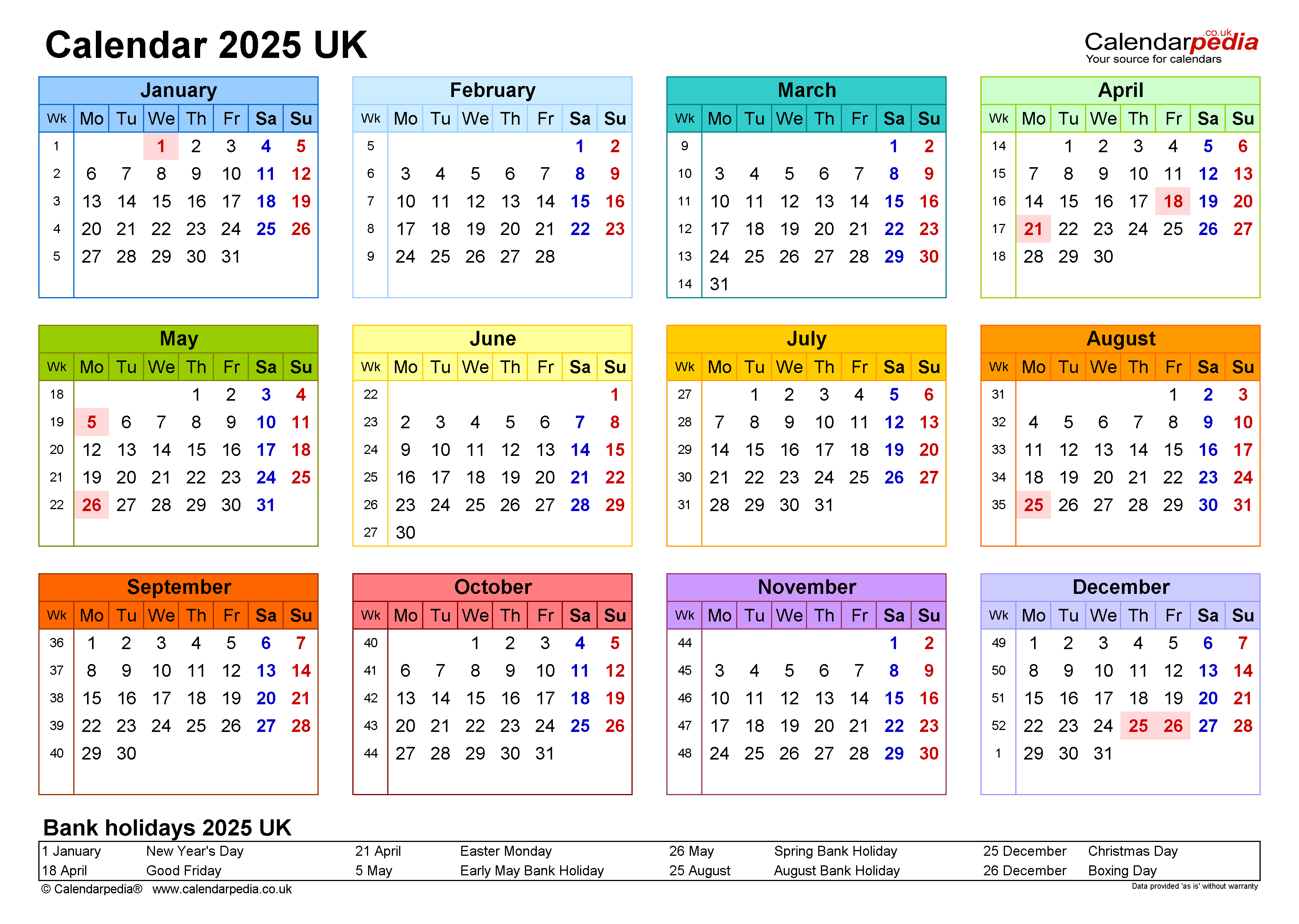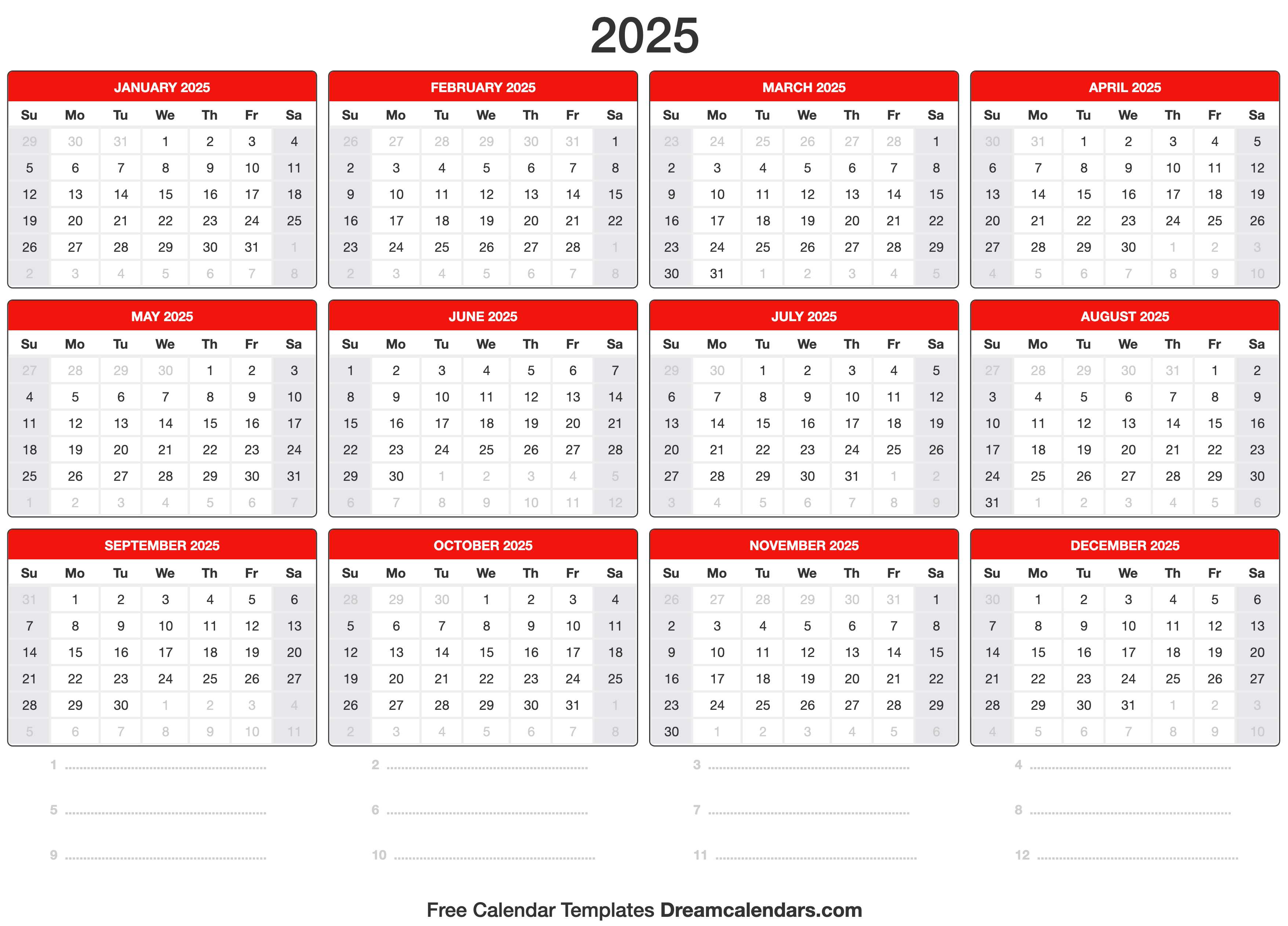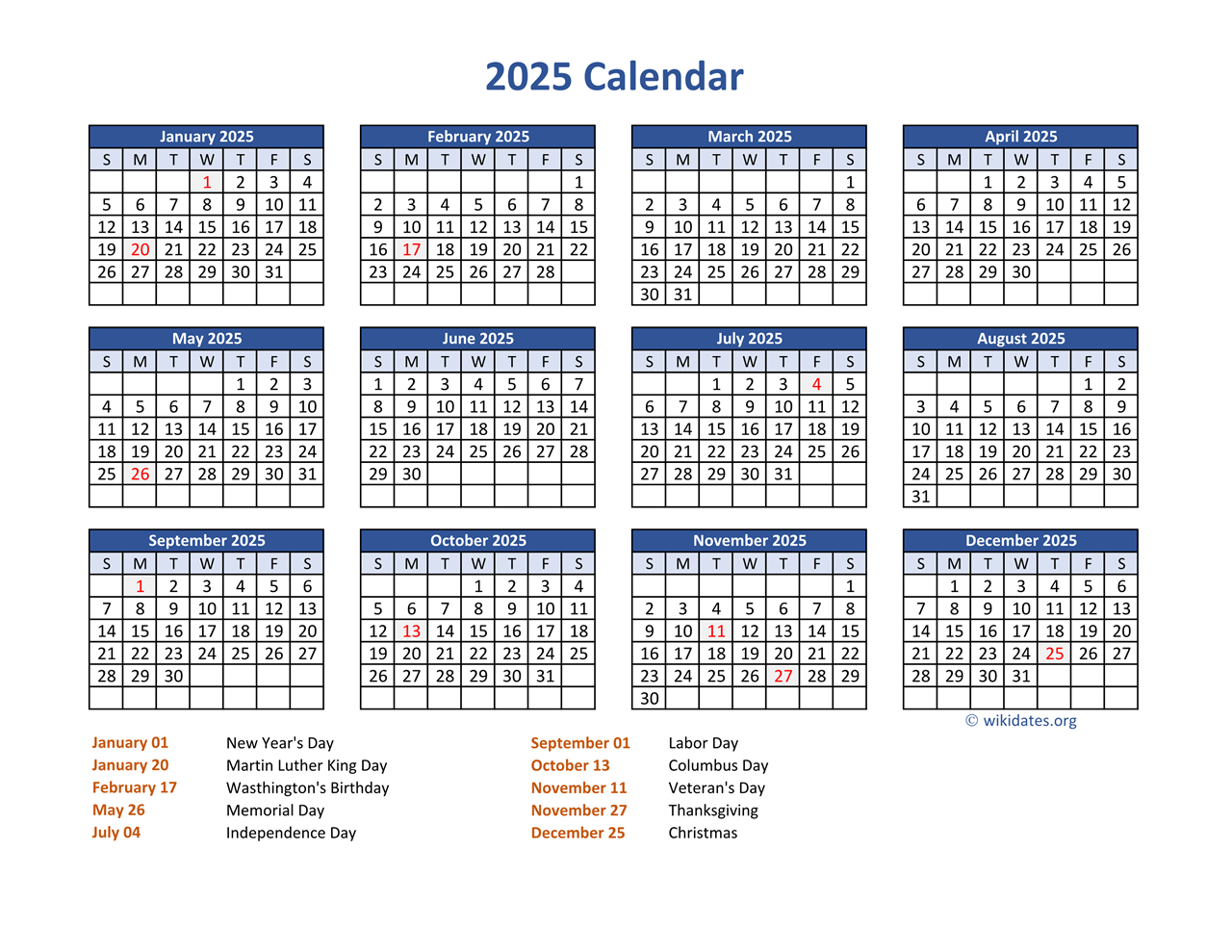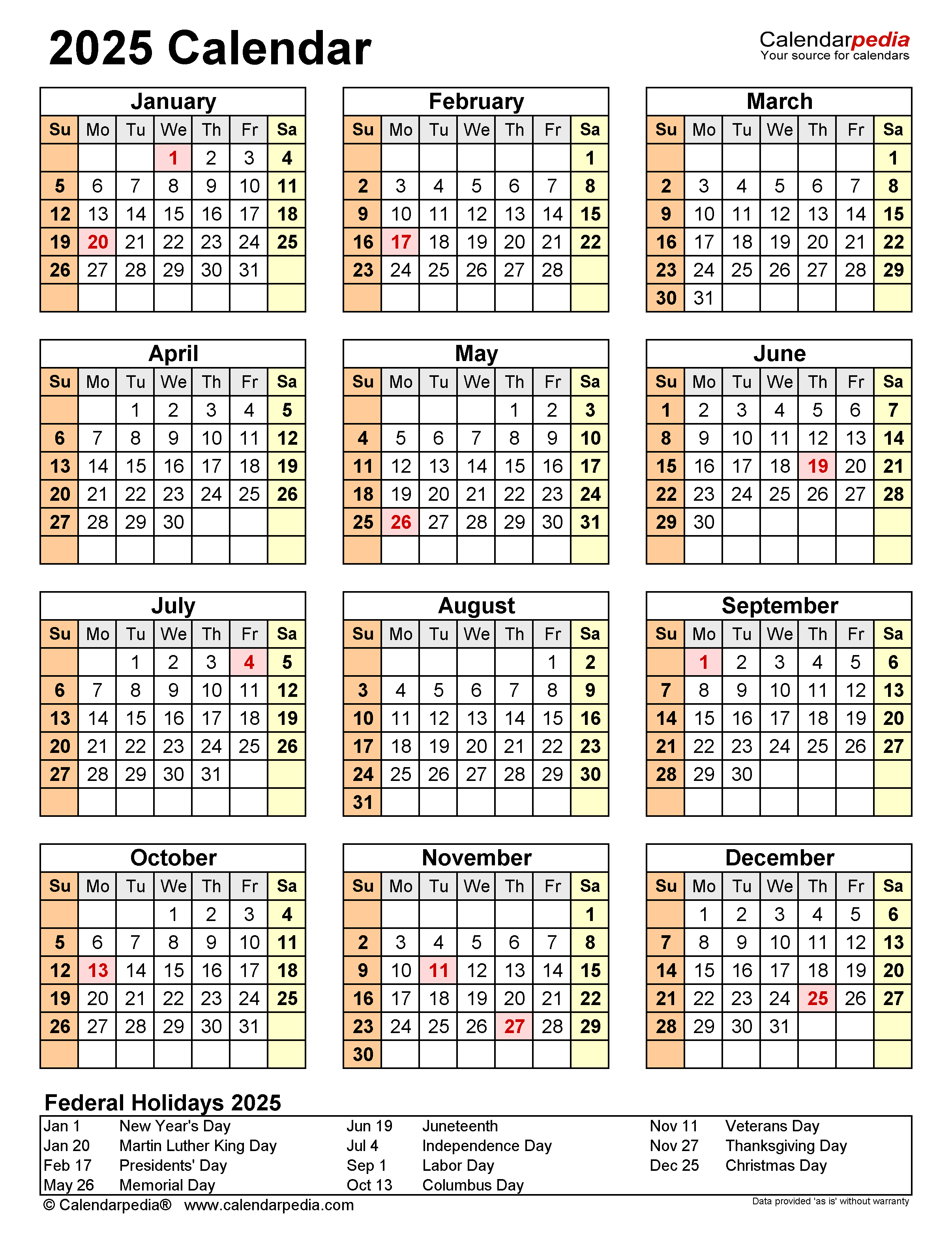Navigating the Year Ahead: A Comprehensive Guide to the 2025 Calendar with Holidays
Navigating the Year Ahead: A Comprehensive Guide to the 2025 Calendar with Holidays
Introduction
With great pleasure, we will explore the intriguing topic related to Navigating the Year Ahead: A Comprehensive Guide to the 2025 Calendar with Holidays. Let’s weave interesting information and offer fresh perspectives to the readers.
Table of Content
Navigating the Year Ahead: A Comprehensive Guide to the 2025 Calendar with Holidays

The 2025 calendar year holds a wealth of opportunities for planning, organization, and celebration. With a comprehensive understanding of its structure, including notable holidays, individuals and organizations can maximize efficiency and enjoyment throughout the year. This guide provides a detailed overview of the 2025 calendar, highlighting key dates and offering insights into its potential benefits for various aspects of life.
Understanding the 2025 Calendar Structure
The 2025 calendar year begins on Wednesday, January 1st, and concludes on Tuesday, December 31st. It comprises 365 days, including 52 full weeks and one extra day, as it is a common year. This structure provides a consistent framework for planning and scheduling throughout the year, allowing for effective time management and anticipation of key events.
Key Holidays and Observances in 2025
The 2025 calendar features a diverse array of holidays and observances, both nationally recognized and culturally significant. Here is a breakdown of key dates, providing insights into their historical context and potential impact:
January
- New Year’s Day (Wednesday, January 1st): This global celebration marks the beginning of a new year, offering an opportunity for reflection, goal setting, and fresh starts.
- Martin Luther King Jr. Day (Monday, January 20th): This federal holiday honors the life and legacy of Dr. Martin Luther King Jr., a prominent civil rights leader, emphasizing the importance of equality and social justice.
February
- Groundhog Day (Thursday, February 2nd): This quirky tradition, rooted in folklore, involves observing a groundhog’s behavior to predict the duration of winter.
- Valentine’s Day (Sunday, February 14th): This romantic holiday celebrates love and affection, often marked by gifts, expressions of endearment, and special celebrations.
- Presidents’ Day (Monday, February 17th): This holiday commemorates the birthdays of George Washington and Abraham Lincoln, honoring their contributions to the founding and development of the United States.
March
- St. Patrick’s Day (Tuesday, March 17th): This cultural celebration honors the patron saint of Ireland, often marked by parades, traditional music, and green attire.
- Spring Equinox (Monday, March 20th): This astronomical event marks the official beginning of spring in the Northern Hemisphere, signifying the shift from winter to warmer temperatures and increased daylight hours.
April
- Easter Sunday (Sunday, April 6th): This Christian holiday celebrates the resurrection of Jesus Christ, often marked by religious services, egg hunts, and festive meals.
- Earth Day (Friday, April 25th): This annual event raises awareness about environmental issues and promotes sustainable practices, encouraging individuals and organizations to protect the planet.
May
- Mother’s Day (Sunday, May 11th): This holiday honors mothers and motherhood, often marked by gifts, cards, and special celebrations.
- Memorial Day (Monday, May 26th): This federal holiday commemorates those who died in military service, honoring their sacrifice and dedication to their country.
June
- Father’s Day (Sunday, June 15th): This holiday honors fathers and fatherhood, often marked by gifts, cards, and special celebrations.
- Summer Solstice (Thursday, June 20th): This astronomical event marks the longest day of the year in the Northern Hemisphere, signifying the peak of summer and the transition to shorter days.
July
- Independence Day (Thursday, July 4th): This federal holiday commemorates the signing of the Declaration of Independence, celebrating the birth of the United States as an independent nation.
August
- Labor Day (Monday, September 1st): This federal holiday honors the contributions of workers to the nation’s economy and society, recognizing their hard work and dedication.
September
- Autumn Equinox (Wednesday, September 23rd): This astronomical event marks the official beginning of autumn in the Northern Hemisphere, signifying the shift from summer to cooler temperatures and shorter daylight hours.
October
- Columbus Day (Monday, October 13th): This holiday commemorates the arrival of Christopher Columbus in the Americas, often sparking discussions about its historical context and impact on Indigenous populations.
- Halloween (Thursday, October 31st): This festive holiday, rooted in ancient Celtic traditions, is characterized by costumes, trick-or-treating, and spooky decorations.
November
- Veterans Day (Monday, November 11th): This federal holiday honors all veterans who have served in the United States Armed Forces, acknowledging their sacrifices and contributions to national security.
- Thanksgiving Day (Thursday, November 27th): This national holiday celebrates the harvest and expresses gratitude for blessings received, often marked by family gatherings and traditional meals.
December
- Christmas Day (Tuesday, December 25th): This Christian holiday celebrates the birth of Jesus Christ, often marked by festive decorations, gift-giving, and religious services.
- New Year’s Eve (Monday, December 31st): This global celebration marks the end of the year, often characterized by parties, fireworks, and resolutions for the new year.
Benefits of Utilizing the 2025 Calendar with Holidays
A comprehensive understanding of the 2025 calendar, including its holidays and observances, offers numerous benefits for individuals and organizations:
- Effective Time Management: The calendar provides a structured framework for planning and scheduling, enabling efficient allocation of time and resources.
- Enhanced Organization: By anticipating key dates and events, individuals can better organize their personal and professional lives, minimizing potential conflicts and maximizing productivity.
- Improved Communication: A shared understanding of holiday schedules facilitates better communication and collaboration within teams and organizations, ensuring everyone is aware of potential disruptions or time-sensitive deadlines.
- Enhanced Productivity: By factoring in holidays and observances, individuals can avoid scheduling critical tasks during periods of potential distraction or reduced workforce availability.
- Increased Engagement: Recognizing and celebrating cultural and national holidays fosters a sense of community and belonging, enhancing employee morale and engagement within organizations.
FAQs Regarding the 2025 Calendar with Holidays
Q: Are all holidays listed in the calendar legally recognized?
A: The calendar includes both federally recognized holidays, such as Independence Day and Memorial Day, and culturally significant observances, such as St. Patrick’s Day and Halloween. Not all holidays are legally recognized as days off from work, but they are nonetheless important for understanding the cultural landscape and potential impact on scheduling and communication.
Q: How can I utilize the calendar for personal planning?
A: The calendar can be used to plan personal events, such as vacations, birthdays, and anniversaries. By identifying holidays and potential disruptions, individuals can make informed decisions about scheduling and ensure they have ample time to prepare for important events.
Q: How can organizations use the calendar to improve efficiency?
A: Organizations can use the calendar to anticipate potential disruptions to operations due to holidays and observances. This allows for proactive planning, such as scheduling meetings and events around holiday periods, and ensuring adequate staffing levels during peak seasons.
Q: Are there any resources available to help me understand the calendar better?
A: Numerous online resources, such as calendars, websites, and mobile applications, provide detailed information about holidays and observances, including their historical context and cultural significance.
Tips for Utilizing the 2025 Calendar with Holidays
- Plan Ahead: Utilize the calendar to plan ahead for major events, holidays, and potential disruptions to your schedule.
- Communicate Effectively: Share the calendar with colleagues, friends, and family to ensure everyone is aware of important dates and potential scheduling conflicts.
- Be Flexible: While the calendar provides a framework, be prepared to adjust your plans as needed, accommodating unforeseen circumstances or changes in priorities.
- Respect Cultural Diversity: Recognize and celebrate the diverse cultural holidays and observances represented in the calendar, fostering inclusivity and understanding.
Conclusion
The 2025 calendar year, with its unique blend of holidays and observances, offers a rich tapestry of opportunities for planning, organization, and celebration. By utilizing this comprehensive guide, individuals and organizations can navigate the year effectively, maximizing their productivity, enhancing communication, and fostering a sense of community and belonging. The 2025 calendar serves as a valuable tool for navigating the year ahead, promoting efficiency, engagement, and a deeper understanding of the diverse cultural landscape.








Closure
Thus, we hope this article has provided valuable insights into Navigating the Year Ahead: A Comprehensive Guide to the 2025 Calendar with Holidays. We thank you for taking the time to read this article. See you in our next article!